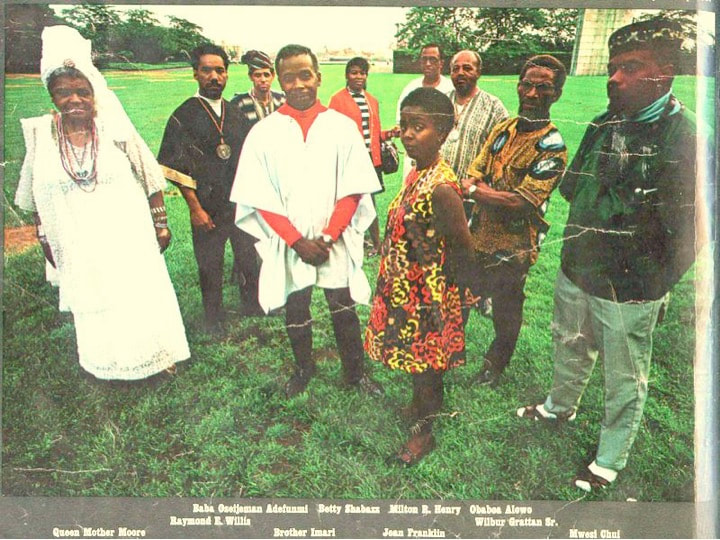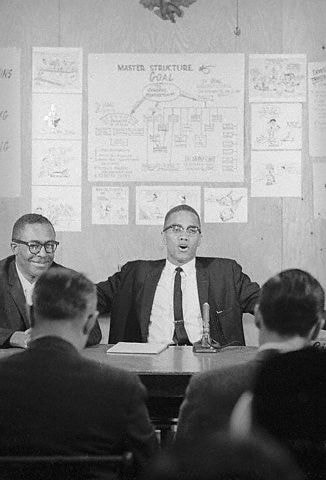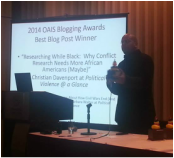When I was writing about the book about the group many people were unclear about why I was doing this. The book on the Black Panther Party before that made sense to them because people had heard of it but who was the RNA? Why turn to them? I want to revisit the RNA in the current moment because what they highlighted as problematic is extremely important for framing discussions moving forward.
The RNA emerged out of a civil rights group that tried to fit in/integrate called GOAL – The Group on Advanced Leadership in the early 1960s. What the group wanted to do was fairly straightforward. They wanted to get a decent foothold in the existing political-economy through a variety of strategies that addressed they felt were holding them back:
- 1. Schools:
- Equalizing class size to white institutions;
- Using the same tests for all students;
- Firing prejudiced, lazy teachers; and,
- Getting truthful history and textbooks.
- 2. Justice:
- Ending Shoot-to-kill policies by the police;
- Firing “brutal” cops;
- Halting illegal search and arrest; and,
- Learning how to shoot a rifle.
- 3. Jobs:
- Installing the GOAL “full-employment” plan.
- 4. Economic Self-Help:
- Investing with GOAL to build a Negro-Owned bank.
If these four ideas/policies were addressed, the group felt that blacks would have a chance in America. Note the attention given to the police and the specific policies noted there. Also note the call to have blacks learn to shoot under the label of justice.
The efforts of this group led many to push further in the domain of electoral politics. The group concluded that what hindered black Americans was the limitation of the two-party system. What was needed they concluded was independent political action where African Americans could move between parties in accordance to whoever was providing the better policies for black folk. This led several members to assist Republican George Romney in his bid for Governor in 1962. The outcome was not really what they had in mind. Romney won but it did not lead to any benefits for black folks in general or even the ones that helped get him elected.
by Malcolm’s speech in November of that memorable year (1963). . . we knew, through struggle, of the immensity of the work that faced the black man in America if we were to be truly free. Through struggle we knew of our own limited resources and the great skill and care that would be required were we to support our revolution from these resources – and we were obliged to, unless we wished to be bought and owned by the enemy. We knew, through struggle, of the great pressures that operate upon the black man to make him doubt the need for revolution, to slow down and seek his liberation through a personal acquisition of gadgets and wealth . . . And we knew, finally, through struggle, that we needed something more than the hopelessly too-small-always first aid, the pit-of-the-stomach-empty reforms, of a civil rights organization like GOAL. We needed power. Malcolm told us how – through setting up our own nation: that was our only real hope.
As I state in my book, Malcolm X was very clear on what blacks needed. He thought that they needed a nation of their own as this was the only way to guarantee that they would he heard and that the weapons of the state would not be turned against them. In addition to this, he went on to say that
(T)hey needed some friends and allies (preferably outside of the United States) as well as a new “interpretation” of the civil rights “thing.” As he pointed out, civil rights are domestic issues, which are dealt with or not dealt with within the United States. Human rights, however, are international issues, which are dealt with within the international realm. This is crucial, for he argues that “when you take your case to Washington, D.C., you’re taking it to the criminal who’s responsible; its like running from the wolf to the fox. They’re all in cahoots together. They all work political chicanery and make you look like a chump before the eyes of the world” (X 1964). Malcolm X went on to speak about guerilla warfare and the fact that this is perhaps the most effective way to counter a superior military power. He also identified that black nationalism (defined as African Americans controlling the politics and politicians, the economics and economic units of production, as well as the values within the black community) was already practiced by many within the Christian church, the NAACP, CORE, the SNCC, by Muslims, atheists, and agnostics. They just didn’t call it that (and this was something noted by those who had been in GOAL earlier). In a dramatic change from his previous incarnation that suggested everyone join the NOI, Malcolm X argued that if an organization was practicing black nationalism, it should be joined. It didn’t matter which one; all paths led to empowerment.
While intrigued by these ideas, the group was not quite ready to give up on electoral politics. A second strategy concerned developing an independent party that could more directly and aggressively pursue the things that the black community needed. This led them to form the Michigan chapter of the Freedom Now Party. The idea was to break free from the shackles of two-party domination and advocate for African Americans. Unfortunately, this group could not unseat the existing parties and the bids for political office generally ended up with massive defeats.
While trying to figure out what to do next, Malcolm X was murdered and shortly after this many black people in Detroit engaged in what is alternatively characterized as a rebellion or riot in 1967 following an questionable police raid and subsequent aggressiveness as well as violence. In this context, the group reimagined itself first as the “Malcolm X Society” (i.e., the Children of Malcolm) and then as the Republic of New Africa (RNA). The new group was interested in four things:
- 1. Establish a government for Africans in America;
- 2. Obtain land for the establishment of an independent country in the deep South: Alabama, Georgia, Louisiana, Mississippi, and South Carolina;18
- 3. Hold a plebiscite among Blacks in order to determine the “national status” of the “New Afrikan population in North America”; and,
- 4. Obtain reparations for the treatment of Blacks as slaves19
Now, I do not want to spend the time and space here to talk about why the RNA chose all of the objectives that they did for that is done in the book and the RNA does this quite well themselves. Rather, here I would like to talk about why the group thought that it needed a government and ponder how this is relevant to the current discussion about what to do with police violence and the police.
As many know, nation-states are in part defined by the coercive/force-wielding capacity of central authorities. If one wanted to stop being treated violently by these actors therefore then assuming control over the agents of coercion and force would be a logical solution. This is what the RNA offered. Given the fact that winning elections was perceived to be difficult to do and that even with victory control over the use of coercion and force might be limited in addition to always being beholden to those with previously generated economic wealth, continuing under US jurisdiction did not seem to be a viable option. In addition to this, the idea
was to remove the Malcolmites and the other black nationalist revolutionaries in America from a position where the United States might with impunity destroy them to a position where attacks upon us by the United States become international matters, threatening world peace, and thereby within reach of the United Nations, thereby within reach of our friends in Africa and Asia who would help us. We could not entertain hope of help in our struggle from international sources so long as we conducted our struggle within the United States federal union and as if we were citizens of the United States . . . The Republic was brought about, when it was, to frustrate hostile action of the United States against the seekers of land and power for blacks on this continent, and to create proper safeguards for ultimate success. (Obadele 1968, 3)
Consider the important differences here from the current moment and discussion.
- To the RNA, blacks form a distinct group that deserves sovereignty, control over its own destiny and coercive/forceful power;
No one now seems to be making the case that African Americans have a separate identity from other Americans and thus everything is being framed as granting rights to African Americans as every other American (theoretically).
- To the RNA black, persecution becomes a thing of international concern – not just to citizens of these countries who take action in solidarity but as a thing of concern to international law, monitoring and potentially action from governments as well as INGOs.
Presently, people around the world are protesting but this seems to be where things end. No one is talking about doing anything else discussed like in the R2P - Right to Protect, which calls upon other nations to intervene if violence is being enacted against the citizens of another nation seemingly beyond the control of the government in question. This is in part because the civil as opposed to human rights framing has been adopted.
- Finally, to the RNA the problem of anti-black violence is something that is not believed to be resolvable until black power has been developed.
This is a very different framing from the extension of democratic citizenship frame that is currently under development but what if there is something worth noting here? What if political and economic empowerment facilitates democratic citizenship? If this is the case, then discussions of wealth gaps, reparations, land theft discussed in Pigford v. Glickman and the place of African Americans in the US and global economy are all worthy of discussion. At the moment, this is not well being addressed.
I offer the RNA here as but one slice into what needs to become a fuller discussion of all interpretations and solutions put forward earlier. US history is filled with such proposals. Now is the time to dust them off and bring them forward.



 RSS Feed
RSS Feed
